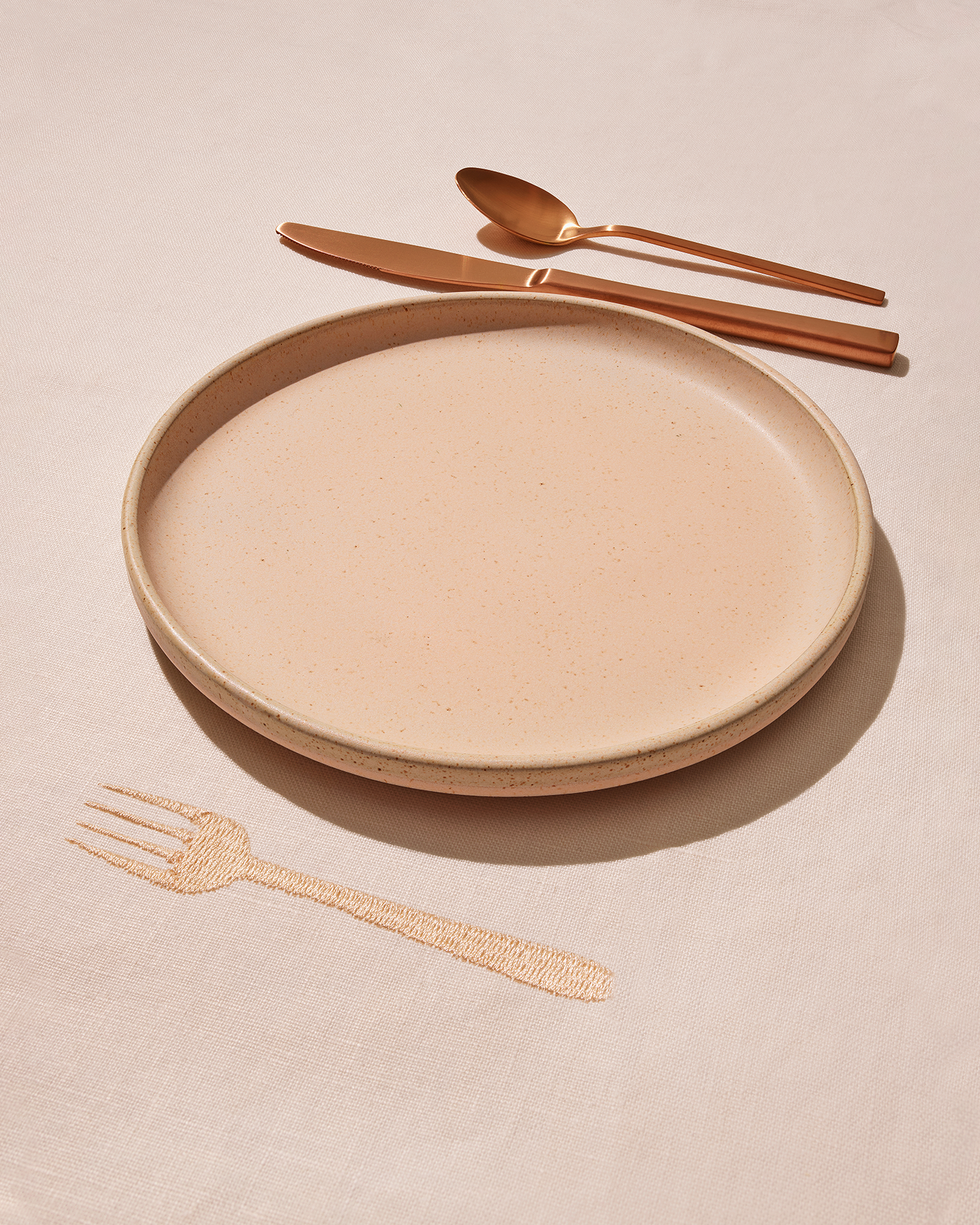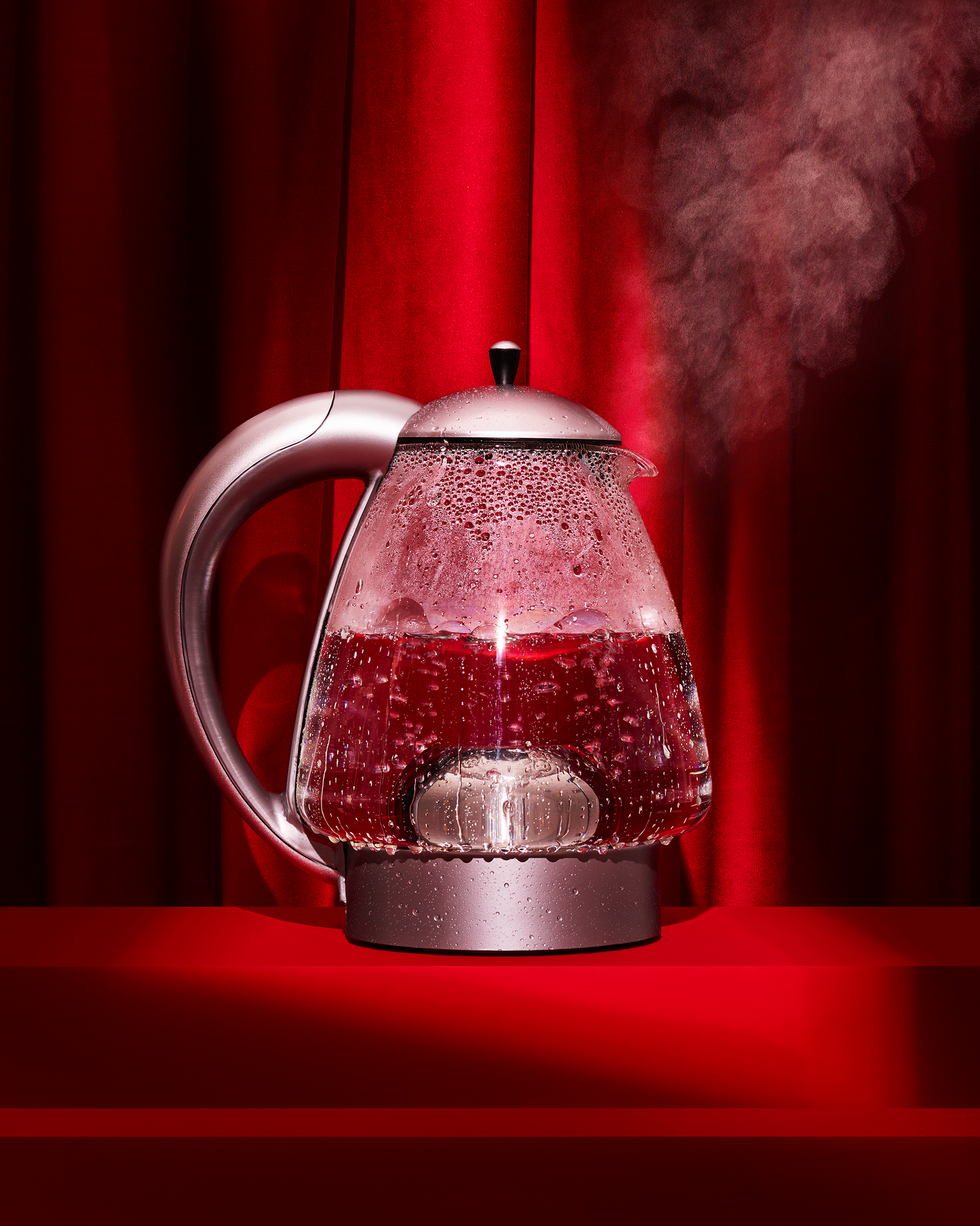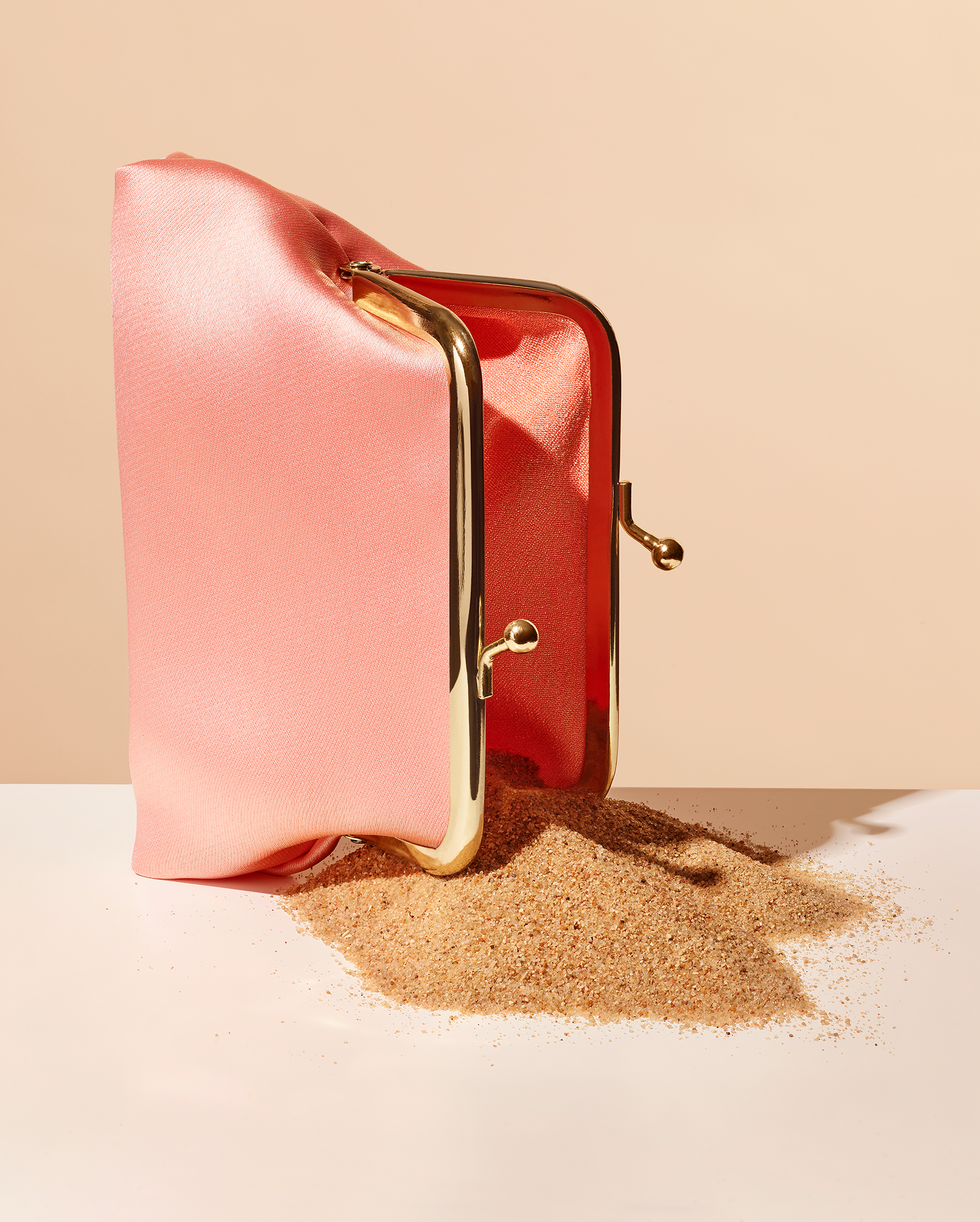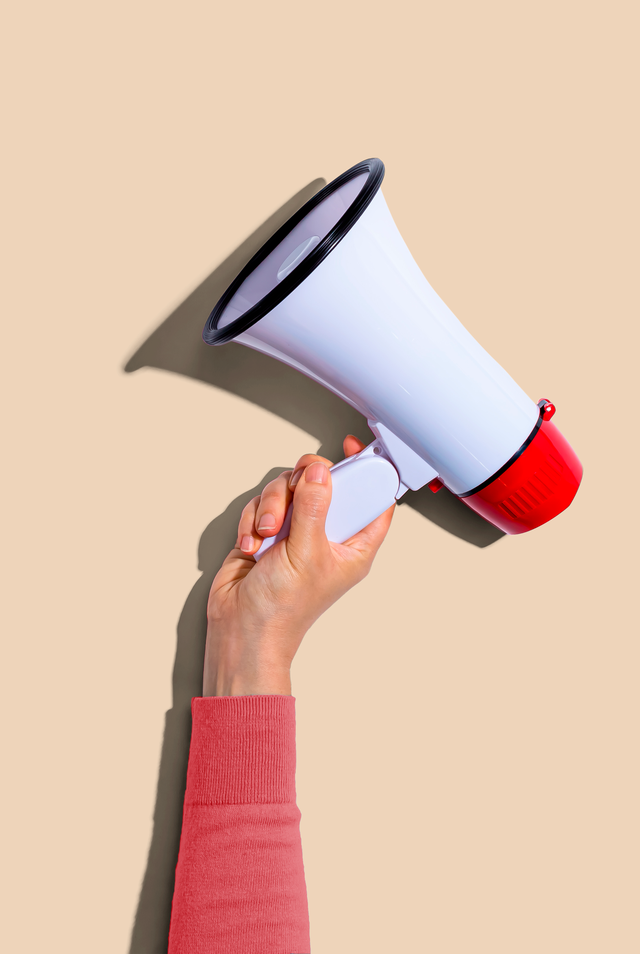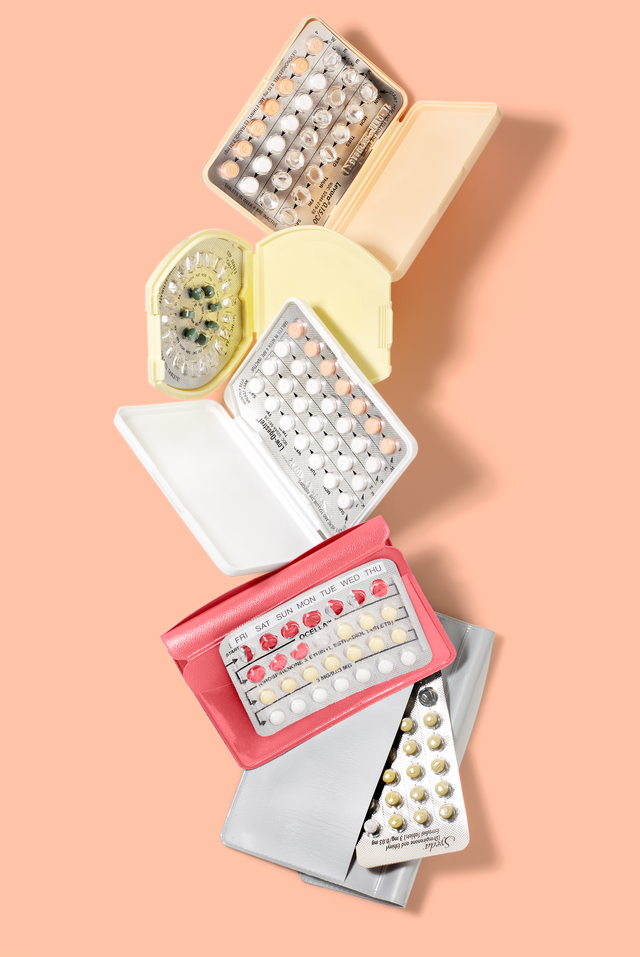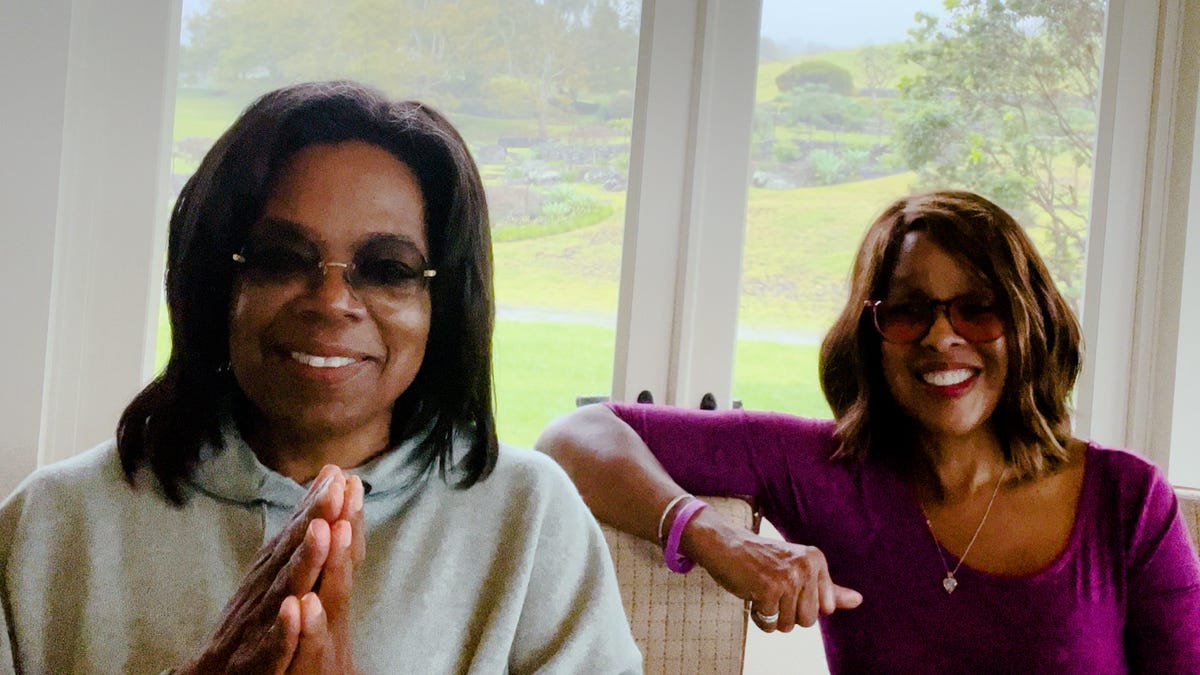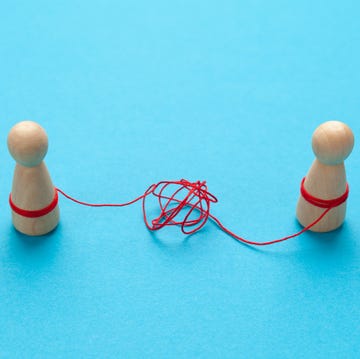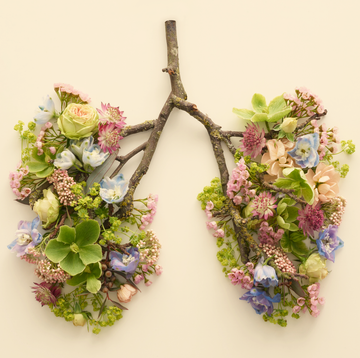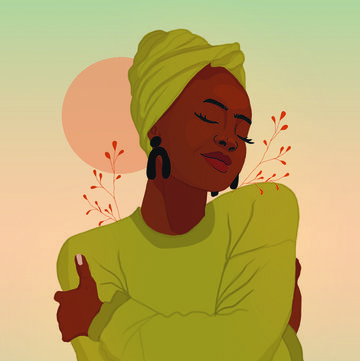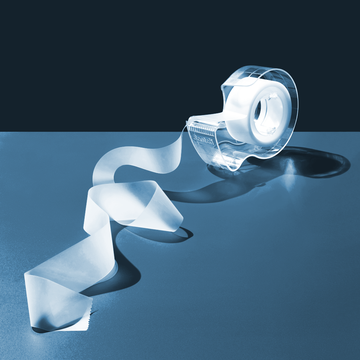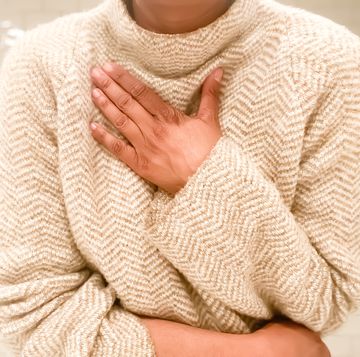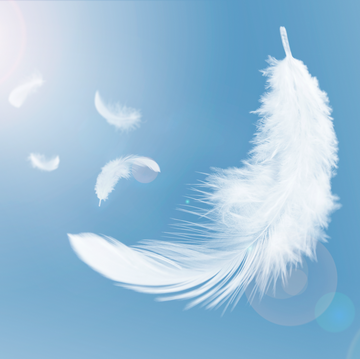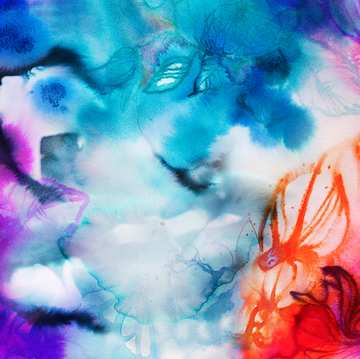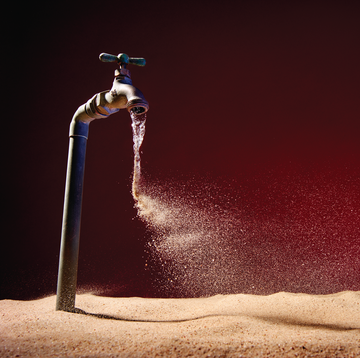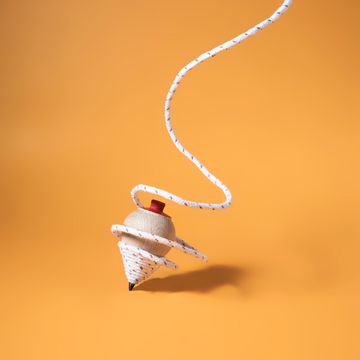In a recent episode of The Michelle Obama Podcast, the former First Lady recalled a hot flash she had on Marine One that left her looking like she’d just finished a 10K. Her guest, friend Sharon Malone, MD, a Washington, D.C.–based ob-gyn and certified national menopause practitioner, brought up symptoms like insomnia, painful intercourse,“screwy periods,” and “murderous rage.” The word discharge was used.
Such frank public discussion would have had Jackie O. clutching her proverbial pearls. But thanks to boundary-pushing moments like this, people today are opening up about menopause unlike ever before, finding support and answers in each other. Communities of in-the-throes women, women-identifying people, and nonbinary people are springing up online in forums like Facebook’s Menopausing So Hard and the Peanut app (essentially Tinder for finding perimenopause buddies). “We’re all spilling the tea right now,” says Omisade Burney-Scott, 55, creator of The Black Girl’s Guide to Surviving Menopause podcast and project, who remembers when her ob-gyn first told her she was in perimenopause, in her early 40s, “I was like, ‘Wait, peri-what?’ I had certainly heard the word menopause before, but I had no sense that [it] was a spectrum.” Now we’re in an amazing cultural moment of clarity about menopause, including what it actually is.
For example, many are surprised to learn that menopause technically refers to the day that marks 12 consecutive months with no period (average U.S. age: 51)—and that the remaining one-half to one-quarter of life is considered post-menopause. The symptoms we associate with this life stage often occur during what’s called perimenopause, the four to 10 years before menstruation ceases, when estrogen and progesterone, the two sex hormones responsible for helping to achieve and maintain pregnancy, begin to rise and fall unevenly. This means that by age 40, you may already begin to experience these symptoms—and many may catch you off guard.
That was the case for longtime style maven Stacy London, 52, who was blindsided at age 47 by a slew of nightmarish happenings, including hot flashes, heart palpitations, memory lapses, crippling anxiety, dry skin plus acne, and an evaporated libido. It took two years of confusion, fear, and visits to specialists with concerns about early-onset Alzheimer’s before she finally realized perimenopause was the culprit. Now CEO of State of Menopause, a company offering meno-specific personal care, London is joining a chorus of those “screaming from the rooftops” to help build a sense of community around a long-isolating topic.
That’s excellent news for the approximately 1.3 million women joining Club Menopause annually. That includes Gen Xers like me, now firmly in peri’s sweet spot, and even cusp millennials. We’re on the verge of finally canceling the inexplicable shame surrounding menopause and dishing the dirt with our friends—more so than with our doctors or partners, according to a survey of more than 6,000 women from online menopause clinic Gennev.
There’s a lot about menopause you may not know to expect, but there are ways to take control. Let us fill in the gaps with girlfriend-vetted, expert-verified intel and solutions.
You Might Forget the Word for "Fork"
“We have conversations where we take turns finishing each other’s sentences—because we’re constantly losing our own train of thought.” —copywriter Kari Roetman, 53, about her and entrepreneur best friend Karla Nelson Wolf, 53, both from Clear Lake, Minnesota
The experts say: While difficulty with word recall and other memory problems can feel frightening (several people interviewed for this article described being scared about early-onset dementia), they’re common manifestations of undulating hormone levels, because estrogen impacts brain functioning, says Elizabeth Poynor, MD, PhD, a gynecologic oncologist and advanced pelvic surgeon in Manhattan.
Though early dementia is rare, women do have a greater lifetime risk than men for Alzheimer’s, and this may be linked with menopausal loss of neuroprotective estrogen. Lifestyle tweaks, including vigorous exercise (it improves blood flow to the brain and produces a protein called BDNF that helps grow new nerve cells essential for learning and memory), may help safeguard future cognition. Quit smoking if you do, and try the Mediterranean way of eating—loads of produce, beans, whole grains, good-for-you fats, fermented dairy products, and small amounts of animal protein—which has been linked with reduced risk of dementia.
The girlfriends say: Lasara Firefox Allen, 50, a substance abuse counselor and author in Ukiah, California, recalls trying to log into their bank account—a routine task—and having “to verbally talk myself through every step of the process.” Names flew out the window, as did nouns in general. For her part, London recalls struggling to remember everyday words like orange and fork. On the upside, these scares convinced her it was time to take control of her health. “There’s a moment when you assess what’s going on with you physically and mentally and you reignite your own agency,” she says.
Hot Flashes, Cold Flashes, and Maybe Panic...Oh My
“A few years ago, I was leading the10 pm newscast when out of nowhere,I was drenched and could hear my heartbeat in my ears. Minutes later, I was lying on the cold tile floor of the bathroom surrounded by several confused coworkers.” —Tamsen Fadal, 51, Emmy-winning NYC news anchor
The experts say: Around 85 percent of us will experience hot flashes, making them one of the most common perimeno-festations. (Night sweats are just p.m. hot flashes.) The meltdowns, which often include spin-class-worthy sweating, facial flushing, and rapid heart rate, are thought to strike when decreased estrogen levels confuse the body’s thermostat (in the brain),tricking it into thinking you’re overly warm. The hot flash, counterintuitively, is your system’s way of cooling you down. (Not to be confused with cold flashes, also caused by a discombobulated internal thermostat.) Twisting the knife, a sense of impending doom can precede flashes, causing them to sometimes be confused with panic attacks. (“The sensations can be quite similar,” explains my ob-gyn, Seema Venkatachalam, MD, clinical assistant professor at Northwestern Medicine, Feinberg School of Medicine and a partner of Northwestern Specialists for Women in Chicago.)
Hormone therapy (HT) can extinguish 90 to 95 percent of hot flashes. So can some antidepressants, and supplements like black cohosh and wild yam, both of which are thought to have hormone-mimicking effects on the body, though Malone says “it’s 50-50” whether supplements will work.
The girlfriends say: Fadal found moderate relief with herbal supplements like maca root and black cohosh but ultimately turned to HT, which eased the hot flashes and night sweats along with some brain fog and hormone-related anxiety and depression. Dressing in layers makes it easier to strip when the heat hits, and she also swears by a cooling neck fan that resembles old-school headphones, buying them for friends when they become flashers. (She sent me one after we spoke for this story.)
Your Periods Will Play Hide-and-Seek
“My cycle was right as rain ever since I got my first period, in 1979, during Mr. Barnes’ math class. At 40, it turned wonky, doing this shortening/elongating thing. At 41, I found myself pregnant, and I ended up going through perimenopause with one child in college and another in daycare.” — Burney-Scott
The experts say: This is commonplace in perimenopause; the drop in estrogen isn’t linear so much as it is, well, wonky, says Venkatachalam. “Periods may seem like they’re coming at the beginning and end of every month. Then maybe they’ll be six weeks apart for a while, then you won’t get one for four months.” The next thing you know, you’re Charlotte in And Just Like That..., getting a “flash period” in a white jumpsuit.
Low-dose birth control can regulate these periods or, if taken continuously, prevent them altogether. It will also reduce the odds of any unplanned pregnancies, which Burney-Scott says her mother and aunts called “change-of-life babies” when she was little.
The girlfriend says: For Julie Bigboy, 48, a website content creator and business owner from Alpine, California, wearing washable period panties worked for catching breakthrough spotting and surprise periods. She likes that they’re more cost-effective and environmentally friendly than pads, plus “they work great for occasional light bladder leakage and sweat.”
The Guy in Edvard Munch’s The Scream Will Be Your Spirit Animal
“One night, I just let loose on my husband, listing all the things I didn’t like about him. We both just sat there afterward, stunned. I couldn’t understand what was happening. It was like a different person was processing my thoughts.” —Amanda Thebe, 51, Toronto-based certified personal trainer and author of Menopocalypse
The experts say: Perimenopausal rage—and depression and anxiety—is real.“Estrogen and progesterone impact the neurotransmitters in our brain, which affects our mood,” says Poynor. In a study of40,000 women conducted by telemedicine start-up Evernow, 60 percent reported anxiety or depression during perimenopause or menopause. Insomnia doesn’t help matters (hormone changes and restful sleep often go together like water and laptops), nor does a history of mental health issues, which can rear up as hormones yo-yo.
In addition to low-dose antidepressants, treatment options include HT or low-dose birth control, therapy, mindfulness practices, regular exercise, and certain supplements.(Poynor, a functional medicine expert, says magnesium glycinate, maca root, B-complex vitamins, and phytoestrogens may help.)
The girlfriend says: Chicago artist Ann Heintz, 52, says the mood swings she experienced in peri were more intense than those she’d had during decades of living with bipolar disorder. In addition to angry outbursts and anxiety, Heintz says that as someone who never had biological kids, she also struggled coming to terms with what menopause represented, bigger picture.“We’re such a youth-chasing culture, and the fact that it was the end of my fertile years hit me hard,” she explains. “I felt like an old hag, useless.” She found fast relief from her mood swings with a low-dose antidepressant.
It’s a Pain in Your...Everything
“My knees, my elbow, my hips and ankles—it all hurt. When I’d get up in the morning, I’d have to roll over onto my side, slowly unfold myself, stand up, and get the cricks out.” —Firefox Allen
The experts say: Welcome to the exciting world of menopausal joint pain, hormonal-induced aches that strike as a result of a reduction of estrogen levels.Estrogen is a steroid hormone with anti-inflammatory properties, so it makes sense that as levels fall, aches and pains emerge. Menopausal joint pain is commonly misdiagnosed as fibromyalgia or just chalked up to growing older and falling out of shape. But Stephanie S. Faubion, MD, medical director of the North American Menopause Society and director of the Mayo Clinic Center for Women’s Health, says that, unlike those scenarios, when a person with menopausal joint aches uses HT, their pain decreases.
Do what you can to maintain a healthy weight (excess weight can stress out joints) and exercise, as “movement increases blood flow to joints and surrounding tissues to prevent stiffness,” says Elizabeth Ward, MS, RD, coauthor of The Menopause Diet Plan.
The girlfriend says: Gabriella Espinosa, 56, is a women’s wellness coach, sexuality educator, menopause mentor, and longtime yoga instructor in Austin. She switched from vigorous yoga to a more restorative style when she was going through menopause and her joint pain flared up, and adds that yoga is also known to improve a slew of perimenopausal symptoms, including poor sleep, stress, depression, and fuzzy-mindedness. ForFirefox Allen, the estrogen-progesterone-testosterone trio of HT largely eradicated the achy, persistent pain.
Sex Might Lose Its Luster
“My sexual desire and ability to become aroused felt like they had died. I thought, Oh my God, is this it? I’m done?” —Espinosa
The experts say: Falling estrogen and testosterone levels can sap sex drive, says Faubion. These slumps may be even more pronounced in people who experience an abrupt menopause (caused by chemotherapy or surgical removal of the ovaries), which causes estrogen and testosterone to both quickly plummet. Not helping matters: It’s hard to get in the mood when you’re exhausted from fractured sleep, feeling anxious or depressed during the day, or panicked about your suddenly foggy memory. The humming estrogen levels of youth also helped everything stay lubed. As they decrease, the vagina and vulva (the skin on the outside of the vagina) become thinner, drier, and less stretchy.
Poynor says small doses of vaginal estrogen (via cream, ring, or tablet) can hydrate dry tissues, ease burning and itchiness, and make penetrative sex less painful, and because it’s very low-dose and absorbed locally (versus oral or patch forms of HT, which are absorbed systemically),almost all women can safely use it, including breast cancer survivors. (However, if you have an estrogen-driven malignancy, check with your oncologist first, says Poyner.)
The girlfriends say: An estrogen patch resuscitated Espinosa’s libido. ForFirefox Allen, a combination of Lifeflo by Estro-Care (estrogen), wild yam cream (purported to have progesterone-like effects), and testosterone made a huge difference. After adding in the testosterone, “I masturbated for the first time in months,” Firefox Allen says.
Once your spark reignites, your vagina. will probably still need a moisture boost. For Espinosa, a combo of lubricants, vaginal moisturizers, and twice-weekly vaginal estrogen cream helped immensely. She also underwent a series of FemiLift laser treatments, during which a vaginal probe stimulates collagen production and increases blood vessel formation using painless laser technology. (Mona Lisa Touch is another type.) After her third session, “it was like magic,” she says. “It still takes longer to reach arousal, but once I do, lubrication is instant.”
Your Body Can Shape-Shift
“Even though I work out six or seven days a week and eat as healthy as you can imagine, my body just…changed. I gained about 20 pounds. I went from an hourglass to a pooch.” —Kelly Olexa, 52, women’s health and hormone coach, San Antonio
The experts say: Weight gain, especially around the belly, is a clue your hormone levels are doing the Hokey Pokey. Estrogen helps regulate hunger-regulating hormones, so as it poops out in midlife, hunger signals can intensify, leading to increased donut intake. Stress, especially, sends fat towards the belly thanks to a hormone called cortisol. Some of this fat is visible but some accumulates around your internal organs, increasing the risk of heart disease and type 2 diabetes.
Avoid the knee-jerk reaction to starve yourself and focus instead on nourishing, whole foods (protein at every meal; lots of fiber-rich complex carbs like beans, produce, and whole grains) while aiming for a calorie deficit, meaning you take in more than you burn through exercise and the general grind of living. And Malone notes that while HT isn’t prescribed solely for weight loss, those who do use it tend to avoid the belly fat issue.
The girlfriend says: The internet is flooded with perimenopause weight loss tactics, from appetite suppressants to skipping breakfast — “a shit show of bad information,” Thebe says. Exercise-wise, Thebe endorses strength-training several times a week to build metabolically active muscle while giving your body image a lift, something she sees time after time with clients. With diet, Olexa found success with intermittent fasting and keto-style eating.
Leslie Goldman, MPH, has been covering health and wellness for more than 25 years. She regularly contributes feature stories and essays to O: The Oprah Magazine, Better Homes & Gardens, Real Simple, Parents, Prevention, TheGirlfriend.com, and more. Leslie has authored, co-authored, ghost-written, and ghost-edited several books, including \Brave Girls: Raising Young Women with Passion and Purpose to Become Powerful Leaders;\ \Heart Breath Mind: Train Your Heart to Conquer Stress and Achieve Success;\ \Whole 30s' Food Freedom Forever: Letting Go of Bad Habits, Guilt, and Anxiety Around Food,\ \Locker Room Diaries: The Naked Truth About Women, Body Image, and Re-Imagining the 'Perfect' Body;\ and others. She also speaks at colleges and universities on the topics of body image, media literacy, and female empowerment.

